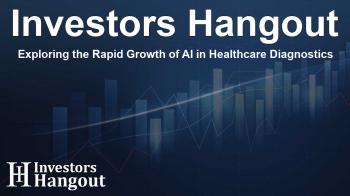Exploring the Rapid Growth of AI in Healthcare Diagnostics

Exploring the Rapid Growth of AI in Healthcare Diagnostics
Artificial intelligence is increasingly playing a vital role in clinical and molecular diagnostics. This technology enables healthcare professionals to analyze medical data such as lab tests and genetic information with remarkable accuracy and speed. Recent research indicates that the market for AI in diagnostics is set to expand from $2.6 billion to an impressive $8.9 billion by 2029, reflecting a compound annual growth rate (CAGR) of 27.6% over the forecast period.
Understanding the AI in Diagnostics Market
This comprehensive report delves into the global market landscape for AI in clinical and molecular diagnostics. It highlights significant growth trends, examines key applications such as medical imaging, and genomic studies. Additionally, it addresses critical drivers of AI adoption, hurdles to overcome, and emerging opportunities. The report also provides insightful profiles of major players in the sector while exploring regional market dynamics.
Key Factors Driving AI's Adoption in Healthcare
Several pivotal factors are contributing to the remarkable growth of AI within the healthcare diagnostics sector:
- Heightened Investment in AI Technologies: An influx of funding into the AI health sector is paving the way for advancements that enable rapid disease diagnosis and enhanced treatment solutions, ultimately improving patient care and reducing overall healthcare costs.
- Rising Incidence of Chronic Conditions: The escalation of chronic conditions like diabetes and heart disease, coupled with the emergence of infectious diseases, has intensified pressure on healthcare systems globally, thus driving demand for efficient diagnosis and treatment methods.
- Innovation through AI Software: The introduction of AI-powered software solutions is transforming diagnostic processes. These advanced tools leverage data analytics to interpret medical images and predict disease outcomes with remarkable efficacy.
- Untapped Potential in Developing Regions: Emerging markets hold promising opportunities for growth in healthcare technologies. Companies are increasingly investing in these areas to offer innovative AI solutions tailored to meet the demands of expanding economies and improved healthcare practices.
AI's Transformative Impact on Healthcare Diagnostics
AI is not only enhancing the diagnostic process but also ushering in two primary revolutionary methods:
- Proactive Health Risk Prediction: By analyzing genetic data, AI can foresee potential health risks before they manifest as symptoms, allowing for preventative healthcare interventions that can prolong health and well-being.
- Unlocking Valuable Insights from Patient Data: Through sophisticated language processing capabilities, AI can sift through medical records and doctor’s notes to extract critical information, enhancing diagnostic accuracy and fostering tailored treatment plans.
Projected Market Dynamics and Insights
In a rapidly evolving landscape, the BCC Research report outlines vital market metrics which include:
- Base Year for Analysis: 2023
- Forecast Period: 2024-2029
- Initial Market Size: $2.3 billion
- Future Market Size Prediction: $8.9 billion
- Annual Growth Rate: A robust CAGR of 27.6% is anticipated throughout the forecast period.
- Market Segmentation: The report categorizes the market into types, components, and regions.
- Global Reach: North America, Europe, Asia-Pacific, and other regions are evaluated.
Key Players in the AI Diagnostics Market
The sector features several prominent companies shaping the future of healthcare diagnostics through innovative AI solutions:
- Atomwise Inc.
- F. Hoffmann-La Roche Ltd.
- Fujifilm Holdings Corp.
- GE Healthcare
- Illumina Inc.
- Koninklijke Philips N.V.
- Medtronic
- Microsoft Corp.
- Siemens Healthineers AG
- Thermo Fisher Scientific Inc.
Frequently Asked Questions
What does the report forecast for the AI in diagnostics market?
The market is expected to grow from $2.6 billion in 2024 to $8.9 billion by 2029, with a CAGR of 27.6%.
Which segments are included in the AI diagnostics market analysis?
Segments covered include type, component, and geographical region.
What is driving the growth of AI in medical diagnostics?
Major drivers consist of increased investment, rising chronic diseases, and technological innovations in AI software.
How is AI improving healthcare diagnostics?
AI enhances diagnostics by predicting health risks and extracting insights from comprehensive patient data.
Who are the leading companies in the AI diagnostics sector?
Key players include GE Healthcare, Illumina, and Microsoft, among others.
About Investors Hangout
Investors Hangout is a leading online stock forum for financial discussion and learning, offering a wide range of free tools and resources. It draws in traders of all levels, who exchange market knowledge, investigate trading tactics, and keep an eye on industry developments in real time. Featuring financial articles, stock message boards, quotes, charts, company profiles, and live news updates. Through cooperative learning and a wealth of informational resources, it helps users from novices creating their first portfolios to experts honing their techniques. Join Investors Hangout today: https://investorshangout.com/
Disclaimer: The content of this article is solely for general informational purposes only; it does not represent legal, financial, or investment advice. Investors Hangout does not offer financial advice; the author is not a licensed financial advisor. Consult a qualified advisor before making any financial or investment decisions based on this article. The author's interpretation of publicly available data shapes the opinions presented here; as a result, they should not be taken as advice to purchase, sell, or hold any securities mentioned or any other investments. The author does not guarantee the accuracy, completeness, or timeliness of any material, providing it "as is." Information and market conditions may change; past performance is not indicative of future outcomes. If any of the material offered here is inaccurate, please contact us for corrections.
